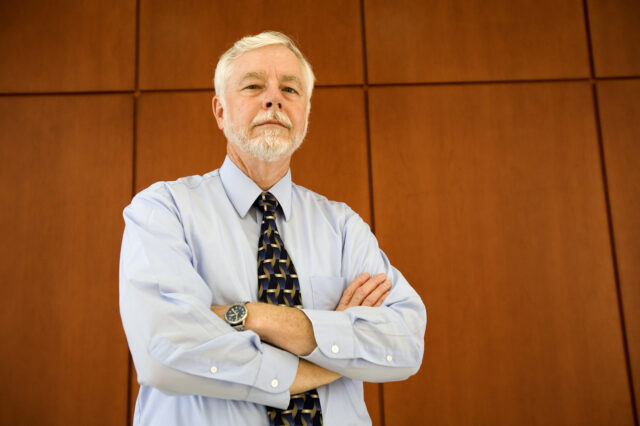Survival rates for UF Health blood and marrow transplant patients are among the best nationwide

Outcomes for patient survival following stem cell transplant at the University of Florida Health Blood and Marrow Transplantation Program, which treats patients with leukemia and other blood cancers, were recently ranked among the top 2.5 percent nationwide.
“Our program is one of only 15 centers nationwide with this distinction. It’s the only one in Florida and one of only four in the Southeast,” said John R. Wingard, M.D., director of the program and the UF Health Cancer Center deputy director for research.
UF Health’s ranking is based on the center’s one-year survival rate for patients who receive allogeneic stem cell transplants, stem cells harvested from a donor who has immune system markers closely matching those of the patient. The Center for International Blood and Marrow Transplant Research lists survival rates in its annual transplant center-specific survival report.
More than 6,000 people undergo allogeneic stem cell transplant in the U.S. every year to treat blood cancers like leukemia, multiple myeloma, lymphoma and others. Donors of matched stem cells can either be a related family member, usually a sibling or parent, or an unrelated volunteer.
The report analyzes survival rates among 167 U.S. stem cell transplant centers using data based on a three-year average and adjusted to account for high-risk patients accepted at acute care centers such as UF Health.
Wingard, who also serves as chairman of the board of directors for Be The Match Registry, the international bone marrow donor registry that matches patients in need of allogeneic stem cell transplant with volunteer donors, said risk-adjusted data are a better measurement for patient survival because transplant outcomes are highly dependent on the patient’s overall health. A patient in need of transplant may be very sick with cancer, but patients considered to be at high risk also have serious comorbidities - life-threatening illnesses such as heart failure, bad kidneys or emphysema - which significantly impact expected outcomes.
“During the period of time studied in this report, UF Health was among the 20 percent of transplant centers nationwide to accept very high-risk allogeneic patients, yet our risk-adjusted survival rate is 11 percent better than expected,” Wingard said. “I’m very proud of our team for that.”
The UF Health Blood and Marrow Transplantation Program, Florida’s longest-established transplant center, has a history of influencing national benchmarks for quality and innovation in stem cell transplantation and patient care. The center was the first in Florida to receive accreditation from the Foundation for the Accreditation of Cellular Therapy and is one of only 20 core centers nationwide that make up the National Heart, Lung and Blood Institute/National Cancer Institute Blood and Marrow Transplant Clinical Trials Network.
Additionally, the UF Health program collaborated with LifeSouth Community Blood Centers to establish one of only five Food and Drug Administration-licensed public cord blood banks in the nation, and UF Health physicians have performed more than 2,700 stem cell transplants in adults and children, perfecting innovative transplant approaches now widely used to expand treatment options for patients who otherwise would not have been candidates for stem cell transplantation.
“Hitting the mark on the excellent outcomes for our patients noted in this report required lots of hard work and a center-wide emphasis on outstanding patient care,” Wingard said. “It has been our team’s labor of love.”